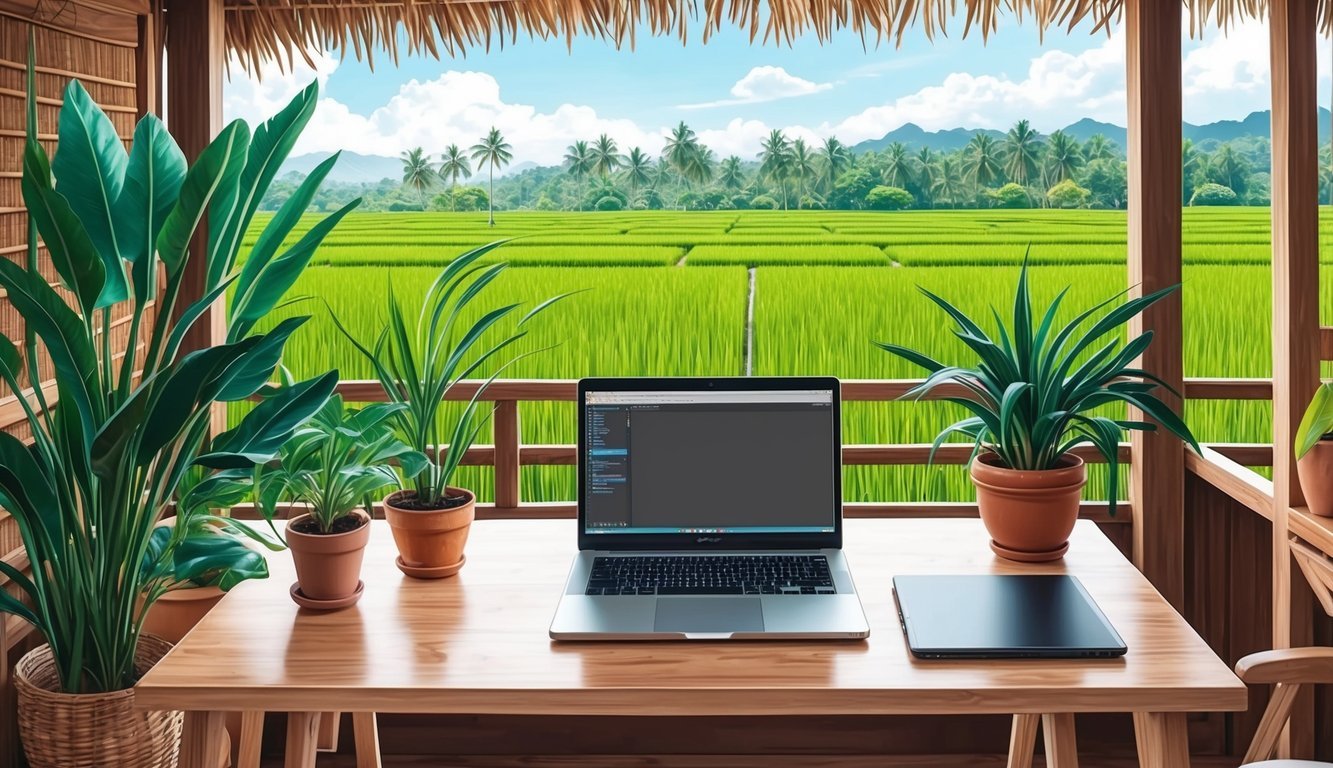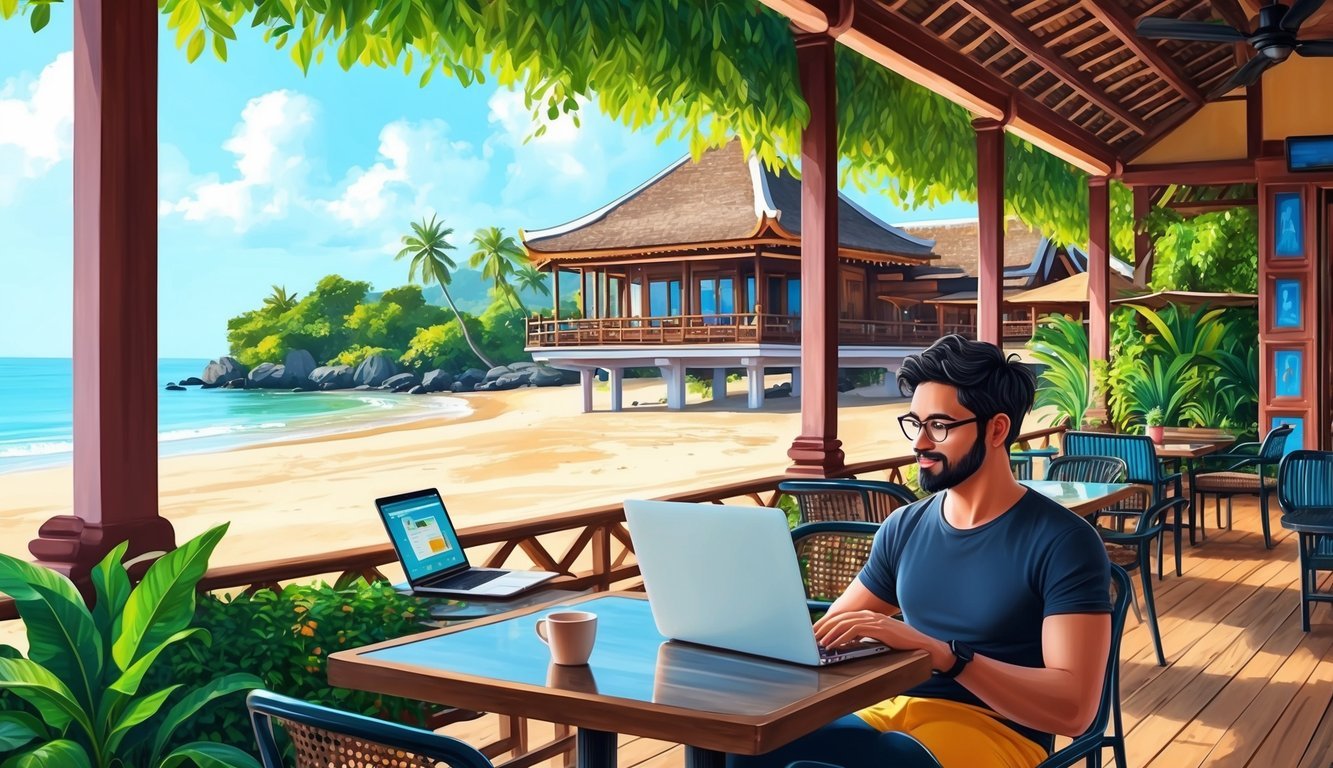Bali, Indonesia, has become a top spot for digital nomads seeking the perfect blend of work and leisure. Bali offers everything you need to thrive as a remote worker. From beautiful beaches to cozy cafes, you’ll find more than just a place to set up your laptop.
It’s a lifestyle that invites adventure, exploration, and connections with like-minded people.
Living in Bali has its perks, like a wide range of coworking spaces and a captivating culture that makes every day feel unique.
You can enjoy a laid-back atmosphere while staying productive.
With plenty of outdoor activities and a rich social scene, you’ll have the chance to unwind after a long day of work.
This island paradise is not just an escape; it’s a place where you can grow both personally and professionally.
Embrace the experience of being a digital nomad in Bali, and see how it can change your life for the better.
Key Takeaways
- Bali provides a supportive community for digital nomads.
- Affordable living and rich culture create a unique lifestyle.
- Many coworking spaces cater to remote workers’ needs.
Why Bali is a Digital Nomad Paradise
Bali offers a unique mix of stunning landscapes, a welcoming community, and endless opportunities for networking.
This tropical paradise is designed for those who work and travel.
Here’s a look at what makes Bali a top spot for digital nomads.
Breathtaking Natural Beauty
When you think of Bali, picture beautiful beaches and lush green landscapes.
The island boasts famous spots like Kuta and Seminyak, where you can relax by the ocean.
The tropical climate makes it enjoyable year-round, with warm temperatures and plenty of sunshine.
You can take breaks from work to hike to waterfalls like Tegenungan or explore rice terraces in Ubud.
Finding a cozy spot to work with a view is easy.
Many cafés and coworking spaces are designed with your comfort in mind.
With this scenery, staying inspired while you work is effortless.
Vibrant Digital Nomad Community
Bali is home to a large and diverse digital nomad community.
You’ll meet people from all over the world, making it easy to connect.
Areas like Canggu and Ubud have many events where you can meet fellow nomads.
You can join groups and forums to share experiences and tips.
There’s a friendly atmosphere, making it easy to strike up conversations.
Expect to find others who understand your lifestyle.
You’ll also discover various interests and cultures, enriching your experience.
This community aspect helps you feel less alone and more connected during your journey.
Networking and Collaboration Opportunities
Bali offers numerous opportunities to network with other professionals.
Many coworking spaces host events, workshops, and talks.
These gatherings allow you to meet potential partners and collaborators.
You can find spaces like Dojo in Canggu, where creatives gather to share ideas.
These settings encourage collaboration, making it easier to find people who share your goals or interests.
Don’t miss out on the chance to join social events like meetups or beach cleanups.
These casual settings create a relaxed environment for networking, making it a breeze to make valuable connections.
Living in Bali as a Digital Nomad
Bali offers a unique experience for digital nomads looking to blend work and leisure.
With its affordable living, stunning scenery, and vibrant culture, you’ll find plenty of opportunities to thrive while enjoying life on this tropical island.
Cost of Living Breakdown
Living in Bali can be very affordable compared to many Western countries.
On average, your monthly expenses may range from $700 to $1,500, depending on your lifestyle.
Here’s a quick breakdown of typical costs:
| Expense | Estimated Cost |
|---|---|
| Accommodation | $200 – $700 |
| Food | $150 – $300 |
| Transportation | $30 – $60 |
| Internet | $30 – $60 |
| Entertainment | $100 – $300 |
Eating local food is cheaper, with meals at warungs (small local eateries) costing around $2 to $5.
If you prefer Western food, prices could be higher.
Be mindful of your dining choices to manage your budget well.
Finding the Perfect Accommodation
Bali provides a variety of accommodation options for digital nomads.
Popular areas like Ubud, Canggu, and Uluwatu offer numerous choices.
You can find:
- Homestays: Often the most affordable, these give you a taste of local life.
- Villas: Private spaces that may offer more comfort at a higher price.
- Co-living Spaces: Great for networking, usually equipped with fast Wi-Fi.
Make sure to check for amenities like a good internet connection, as this is crucial for remote work.
Websites like Airbnb and local Facebook groups can help you find the best spots.
Navigating Visa Options and Regulations
Securing the right visa is essential for living in Bali without worry.
The Digital Nomad Visa is in development but you can currently consider options like:
- Social Visa: Valid for 30 days with the option to extend up to 6 months.
- Tourist Visa: Usually allows a 30-day stay, extendable for another 30 days.
Always check for the latest regulations, as policies can change frequently.
Also, consider your work situation to ensure compliance with local laws.
Healthcare and Insurance Tips
Staying healthy while living in Bali is important.
Bali has several international hospitals, especially in Denpasar, that offer quality care.
Here are some insurance options to consider:
- Nomad Insurance: Covers issues like trip cancellations, equipment loss, and emergencies.
- Medical Insurance: You might want local or international health insurance for doctor visits and emergencies.
Always carry a small first-aid kit and make sure your insurance includes coverage for Bali’s healthcare facilities.
Embracing the Local Culture and Customs
To make the most of your time in Bali, it’s vital to understand local culture and customs.
Respect the local traditions and dress modestly when visiting temples.
Engage with locals and make an effort to learn a few words in Bahasa Indonesia.
This can enrich your experience and help you build meaningful connections.
Participating in community events or classes can also be a fun way to immerse yourself.
Enjoying traditional dishes like Nasi Goreng or Satay is a must.
Local markets are perfect for exploring and tasting diverse flavors while mingling with residents.
Working effectively in Bali
In Bali, successful remote work combines finding the right spaces with reliable internet and knowing how to blend work with play.
Focusing on these aspects can greatly enhance your digital nomad experience.
Seeking Out the Best Coworking and Coliving Spaces
Finding the right coworking and coliving spaces is key for digital nomads.
Spots like Dojo Bali in Canggu offer vibrant communities and plenty of networking opportunities.
You can choose from various memberships that suit your needs.
Coliving spaces, such as Outpost and Hubud, provide a convenient setup where you can work and live in a community.
These spaces often come with added perks like meal options, activities, and events that encourage collaboration.
Consider factors like location, atmosphere, and amenities when choosing your space.
Many coworking spots also host workshops and social events, helping you to connect with others who share your lifestyle.
Internet Connectivity and Remote Work Resources
High-speed internet is essential for remote work in Bali.
Most coworking spaces provide reliable internet, but it’s wise to check reviews to ensure quality.
You can find Wi-Fi ranging from 20 to 100 Mbps in popular areas.
Local cafes also cater to remote workers, offering decent internet speeds alongside great coffee.
Just remember that not all places guarantee a strong connection, so relax and explore until you find your favorite spot.
You can also use mobile internet for backup, with plans that offer good coverage.
Local providers like Telkomsel and XL Axiata have options that work well for your needs, keeping you connected wherever you are.
Balancing Work and Leisure for Optimal Productivity
The beauty of Bali lies in its ability to blend work and leisure.
To boost productivity, consider setting a daily schedule.
Allocate specific blocks of time for focused work, with breaks for relaxation or exploration.
Join local activities like yoga classes or surfing lessons to recharge your mind.
Engaging with your surroundings helps maintain motivation and creativity.
It’s also essential to set boundaries.
Enjoy the vibrant life of Bali, but ensure work responsibilities are met.
A well-structured routine, mixing productivity with enjoyment, will enhance your overall experience in this tropical paradise.
Leisure and Lifestyle
Living in Bali offers a balance between productivity and fun.
You can surf incredible waves, practice yoga in serene settings, enjoy a vibrant nightlife, and explore stunning landscapes.
Here’s what you can look forward to in your leisure time.
Surfing, Yoga, and Other Activities for a Healthy Life
Bali is a top destination for surfing.
Uluwatu is famous for its world-class waves, perfect for both beginners and pros.
You’ll find plenty of surf schools that can get you started.
If you want to relax, yoga studios abound in places like Canggu and Seminyak.
Many offer classes that range from gentle flow to more intense sessions.
You can practice overlooking the ocean, which adds to the experience.
In addition to surfing and yoga, consider hiking to the stunning rice terraces.
It’s a great way to enjoy nature, get some exercise, and take amazing photos.
Exploring the Vibrant Nightlife and Culinary Scene
When the sun sets, Bali comes alive.
Areas like Seminyak and Canggu offer a lively nightlife scene.
You can find beach clubs where you can chill with friends, dance, or enjoy live music.
Don’t miss the food scene either.
From street food to upscale dining, Bali has it all.
Try local favorites like Nasi Goreng or Satay.
There are also plenty of international options.
Sanur is a bit quieter but has charming places to grab a drink by the beach.
You can enjoy live music while taking in the ocean breeze.
Weekend Getaways: Beaches, Rice Fields, and Temples
Bali is small, so weekend getaways are easy to organize.
Tanah Lot is a must-see temple located on a sea rock, perfect for a picturesque sunset.
Take a trip to Seseh for its quiet beaches and stunning views.
It’s less crowded than popular spots, letting you unwind.
You might also explore the rice fields in Ubud.
These terraces are not just beautiful; they provide a peaceful escape from the busier areas.
Community and Social Connections

Living in Bali offers you a unique chance to connect with other digital nomads and expats.
You’ll find a vibrant community that thrives on shared experiences, cultural interactions, and networking opportunities.
Integrating into the Expat and Nomad Communities
To settle in, start by joining online groups, like the Bali Digital Nomads Facebook group.
Many newcomers find friends and collaborators through these platforms.
Once you’re in Bali, explore areas like Canggu, which is known for its bustling expat community.
Here, you’ll find shared housing options, co-working spaces, and cafes where remote workers gather.
Chatting with locals and other expats at beach clubs or during yoga sessions can also help you feel more at home.
Cultural Events and Festivals to Experience
Bali is rich in cultural events that allow you to dive deeper into its vibrant atmosphere.
You can participate in traditional ceremonies, art exhibitions, and local festivals.
Keep an eye out for the Balinese New Year or the Night of Silence (Nyepi), when the island comes together in a unique observance.
Festivals like Ubud Writers & Readers Festival are great for meeting like-minded people while enjoying the arts.
These events not only teach you about the island’s heritage but also open doors to friendships.
Networking Events and Meetups
Networking is key to finding opportunities and expanding your circle.
Bali hosts numerous meetups, workshops, and events tailored for digital nomads.
Places like co-working spaces regularly feature talks and classes where you can learn new skills.
There are also social events that bring together remote workers for casual networking.
As you explore these opportunities, you’ll discover plenty of chances to connect with other professionals who share your interests.
Practicalities of Daily Life

Living in Bali as a digital nomad offers unique experiences in daily life.
From getting around the island to finding fresh produce and wellness options, you’ll find plenty of ways to make your stay enjoyable and convenient.
Transportation: Scooter Rental and Alternatives
Scooter rental is the most popular way to navigate Bali.
You can find rentals almost everywhere, with prices typically ranging from 50,000 to 150,000 IDR per day.
Make sure to always wear a helmet and drive safely.
If you’re not comfortable on a scooter, consider using ride-hailing apps like Gojek or Grab.
They provide affordable rides and food delivery services.
Bali also has some taxis, but they can be more expensive than rides from apps.
For longer trips, you might want to hire a driver for the day, which can cost around 600,000 to 1,000,000 IDR.
Shopping and Daily Necessities
Grocery shopping in Bali can be a delightful experience.
Local markets offer fresh produce like fruits and vegetables at lower prices compared to supermarkets.
You can find them in towns like Ubud and Canggu.
For daily necessities, mini-marts like Indomaret and Alfamart are everywhere, stocking snacks, toiletries, and other essentials.
If you’re looking for unique items or local crafts, check out the artisan markets in Ubud.
You might find something special to take home.
Also, Bali has plenty of cafes and restaurants ranging from affordable local warungs to upscale dining.
Health and Relaxation: Spas and Wellness Centers
When it comes to relaxation, Bali is a paradise.
You’ll discover a range of spas and wellness centers that offer everything from massages to yoga classes.
A traditional Balinese massage can cost around 100,000 to 300,000 IDR.
Popular areas like Canggu and Ubud have numerous wellness retreats where you can join yoga sessions or meditation classes.
These places are often very affordable and can enhance your stay.
Many spas also focus on holistic treatments, combining relaxation with health benefits.
So you can pamper yourself while taking care of your mind and body at reasonable prices.
Adventure and Exploration

Bali offers a wealth of adventures, from thrilling water sports to scenic hikes.
You can enjoy various activities that let you experience the island’s beauty and culture.
Diving into Water Sports: Snorkeling and Scuba Diving
The waters around Bali are perfect for both snorkeling and scuba diving.
Head to spots like Lovina, where you can enjoy vibrant coral reefs and diverse marine life without the crowds.
In addition to Lovina, consider visiting the famous Nusa Penida for breathtaking dive sites.
Schools of fish, colorful reefs, and even the chance to see manta rays await you.
Whether you choose a guided tour or go on your own, make sure you carry your own gear or rent high-quality equipment.
Snorkeling and diving provide that perfect blend of adventure and relaxation amidst stunning underwater landscapes.
Hiking and Outdoor Adventures in Bali’s Terrain
Bali’s lush landscapes call for exploration through hiking.
One great trail is the hike up Mount Batur.
The early morning trek offers magical sunrise views over the island.
Another option is the Campuhan Ridge Walk in Ubud, where you can stroll through rice fields and appreciate the natural beauty.
Casual hikes like this are perfect for soaking in fresh air while enjoying scenic vistas.
If you’re up for a challenge, explore the jungles near Tabanan, where hidden waterfalls and impressive hills await.
Pack some snacks and water, and set off on an adventure you won’t forget.
Cultural Excursions and Discovering Hidden Gems
Bali is not just about nature; it has rich culture to explore.
Visit ancient temples like Tanah Lot or Uluwatu Temple and experience the local history.
These sites offer stunning views and photogenic spots.
Don’t forget to check out the local markets in Pererenan.
Here you can find unique crafts and delicious local foods.
It’s an excellent way to support local artists while enjoying Bali’s vibrant culture.
Moreover, consider joining a cooking class or a local ceremony to immerse yourself fully.
Each experience adds to the adventure while providing a deeper insight into Bali’s unique culture.
Frequently Asked Questions

If you’re considering moving to Bali as a digital nomad, you probably have some questions.
From visa requirements and living costs to the best neighborhoods, here’s what you need to know.
What are the visa requirements for digital nomads looking to stay in Bali?
To stay in Bali as a digital nomad, you generally have a few visa options.
The most common is the B211A visa, which allows stays for about six months.
Make sure to check if you need to extend your visa while you’re there.
How much can I expect to spend living as a digital nomad in Bali?
Living costs in Bali can vary widely.
You might spend anywhere from $600 to $1,500 a month, depending on your lifestyle and housing choices.
Food is affordable, especially if you enjoy local cuisine, but costs can add up if you eat at upscale restaurants.
Are there any tax implications for digital nomads residing in Bali?
As a digital nomad in Bali, you’ll need to think about taxes carefully.
If you remain in Indonesia for more than 183 days within a year, you may be considered a tax resident.
It’s wise to consult a tax advisor to understand your situation better.
What are the best areas to live in Bali for a digital nomad community vibe?
Canggu is a popular choice known for its vibrant community and coworking spaces.
Ubud offers a more laid-back atmosphere, while Seminyak is great for those who enjoy nightlife.
Each area has its own unique vibe and community.
How does the cost of living in Bali compare for digital nomads versus other popular locations?
Bali is generally cheaper than many Western cities.
You can enjoy lower rents and affordable food options.
Compared to places like Tokyo or San Francisco, your dollar will stretch much further in Bali.
What facilities and infrastructure can digital nomads expect when working from Bali?
Bali has numerous coworking spaces equipped with good internet and amenities.
Cafés and restaurants often have Wi-Fi, too.
Besides that, you can find gyms, pools, and wellness centers, making it comfortable for long stays.

